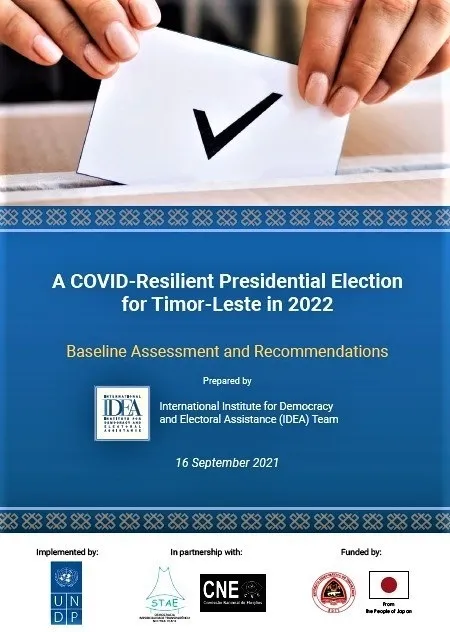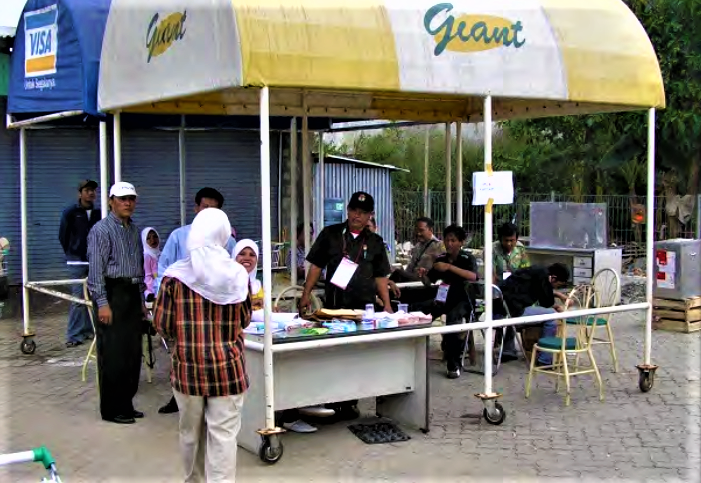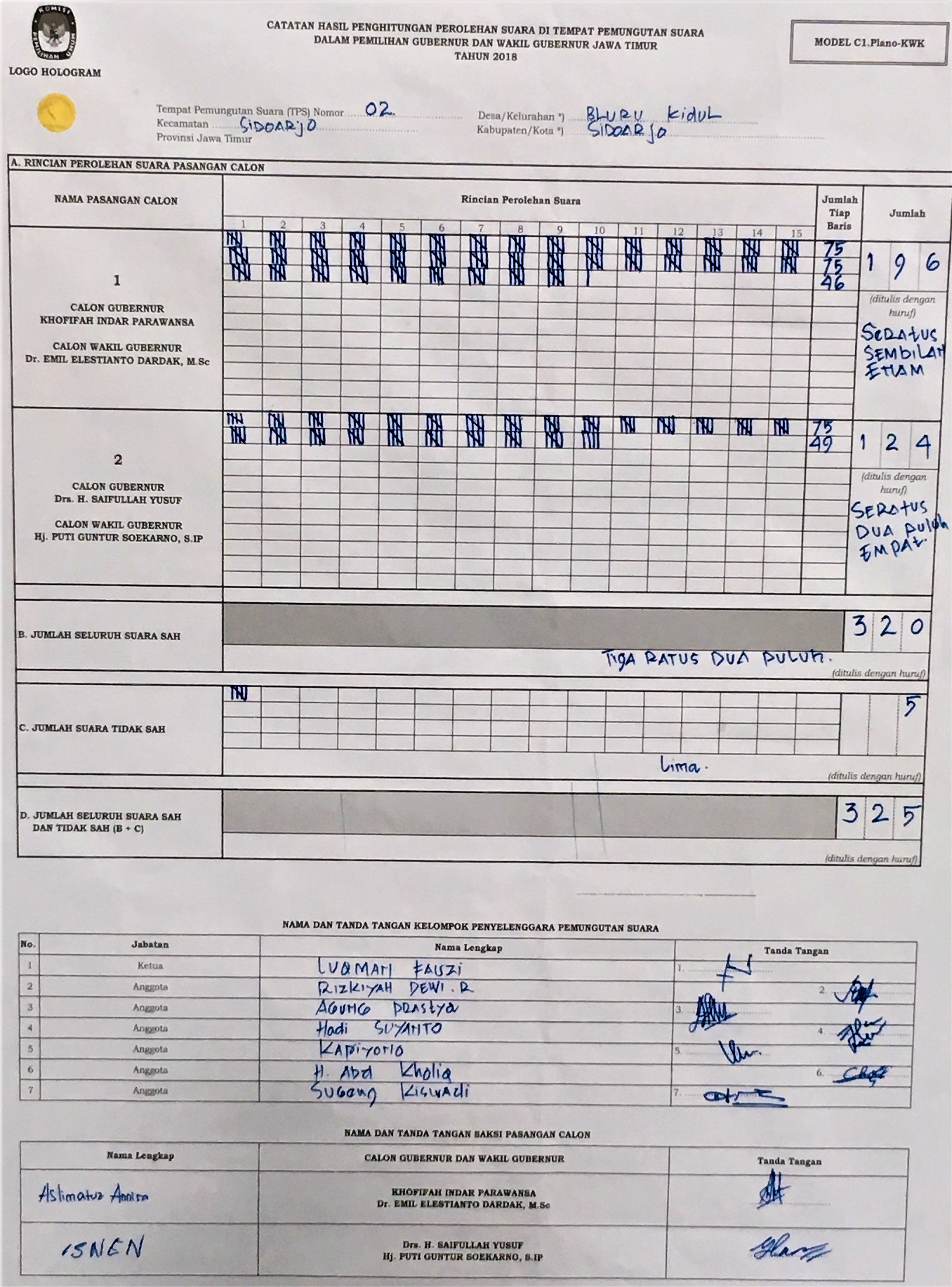A baseline for discussion: Unpacking recommendations for Covid-resilient presidential elections in Timor-Leste

Disclaimer: Views expressed in this commentary are those of the author. This commentary is independent of specific national or political interests. Views expressed do not necessarily represent the institutional position of International IDEA, its Board of Advisers or its Council of Member States.
Timor-Leste has had a strong history of free and fair elections, administered with competence by its electoral management bodies, and praised by international electoral observers. The country’s well-earned reputation as one of the most impressive electoral democracies in South East Asia should be seen as a national asset. While sound administration has underpinned this success, in fact the elections have been societal undertakings, in which the support of all stakeholders has been vital. In the Covid era, this understanding of elections as a shared responsibility of all involved in them is more important than ever. It is vital that the electoral authorities and the public health authorities work in close cooperation, and that all stakeholders in the process are supported in playing their distinct but critical roles.
Timor-Leste is due to hold several national and municipal elections between 2021-2024 and aims to build on its strong history of credible elections, such as the 2017 parliamentary election which was recognized by international election observers to have been ‘...well-administered, transparent and inclusive’[1]. Despite these past successes however, the global Covid-19 pandemic is posing challenges for the country’s two electoral management bodies (EMBs), the Technical Secretariat for Electoral Administration (STAE) and the National Commission on Elections (CNE).
To assist Timor-Leste’s EMBs to overcome these challenges, International IDEA is supporting Covid-safe, credible and inclusive elections under the project “Covid-Resilient Elections in Timor-Leste”. The project, implemented in partnership with the United Nations Development Programme (UNDP), STAE and CNE and funded by the Governments of Japan and Timor-Leste, aims to strengthen the capacity of Timor-Leste’s EMBs to deliver a series of elections that are Covid-resilient, thereby increasing their credibility and participation within them.
As an early contribution to the project, International IDEA has released a contextualized study designed to identify areas of Covid-concern in need of addressing as electoral preparations begin. Translated into Timor-Leste’s official languages of Tetum and Portuguese, ‘A Covid-Resilient Presidential Election for Timor-Leste in 2022: Baseline Assessment and Recommendations’ (hereafter ‘the Assessment’) was shared with key electoral stakeholders on 24 September 2021 after taking note of feedback from two dedicated workshops held in August and September.
Inclusion and Feasibility as Guiding principles
Throughout the Assessment’s development, great care was taken to ensure that proposed recommendations—some of which are highlighted below—do not disadvantage any societal group or risk conferring an advantage on any candidate or party. Equally, International IDEA believes that the recommendations provided are feasible to be implemented effectively by the country’s EMBs.
Contextual Challenges
As highlighted in the Assessment and as shown in many pandemic-era elections held around the world, Timor-Leste’s 2022 presidential elections will be unusually challenging. Constitutional deadlines will require the first round of voting to be conducted in March or early April 2022, when the potential for disruptive weather, such as heavy rains, exists. Furthermore, the economic difficulties caused by the Covid pandemic are making resources scarce across the public sector, while the cost of Covid-safe elections have a higher-than-usual price tag.
With these contextual challenges in mind, the EMBs also need to act on the particular challenges that Covid will bring to credibly administering the electoral process in Timor-Leste. Of particular concern is the ease of the virus’s airborne transmission in crowded environments. This has a particular impact in countries such as Timor-Leste which have often had to use small, sometimes poorly ventilated rooms as polling stations, counting centers and during the tabulation.
Changes required for Covid-safe elections
For such reasons, it will not be possible for Timor-Leste to run a Covid-safe election by simply implementing past processes. Rather, changes will be needed to protect public health, while still satisfying constitutional requirements, and meeting the tests of credibility which ensure that the outcome, and its acceptance, will be legitimate.
Timor-Leste is currently well into a nation-wide vaccination programme in order to help mitigate the spread of Covid-19 across the electoral process and beyond. According to International IDEA, vaccination rates ahead of the elections will be the single greatest determinant of the success of the 2022 elections and full vaccination of electoral staff will be needed not only to prevent the preparations for the election from being disrupted by illness at critical times, but also to reinforce public confidence in the electoral process. To support this, International IDEA recommends that all persons entering polling stations (other than just for the purpose of voting) be fully vaccinated.
Around the world, public rallies and convoys of supporters make up traditional election campaigns, with both of these as mainstay features of the Timor-Leste campaign period. Such activities reflect the exercise of rights guaranteed in the country’s Constitution, in particular the right to freedom of speech, and the right of peaceful assembly. Within this, however, come new and critical considerations of social distancing for the prevention of infection.
Candidate nomination
In Timor-Leste candidates need a threshold of signatures to enter the campaign. Although signatures are traditionally gathered in person, Covid-considerations have led International IDEA to recommend that the legal framework be amended to allow for an online system for the presentation of presidential candidates, and that a decision on whether to develop such a system be made swiftly. In addition, in order to ensure Covid is a primary consideration across the campaign period, ownership and buy-in from political actors will be key. International IDEA therefore recommends that the CNE, as the independent organisation vested with the constitutional mandate to supervise the elections, facilitate a consultative and inclusive Code of Conduct to support a Covid-safe campaign period.
Polling and Counting
Regarding polling and counting, International IDEA recommends several significant changes to traditional electoral procedures in Timor-Leste. Among these are the use of outdoor polling locations where possible, additional polling centers to limit queues and crowding per available resources, and a simple registration process for the parallel voting process which has recently been endorsed by the National Parliament to avoid the traditional mass exodus from the capital city Dili around election day. In addition, recommendations highlight the need to give full effect to legal provisions which already provide for priority to be given at polling centres to pregnant and elderly voters as well as to persons with a disability, in order to minimize their time in the polling centre. Importantly, given Timor-Leste’s particular context, several radical changes to the architecture of polling are specifically not recommended: multi-day polling, extended polling hours, early voting, internet voting and the use of out-of-country postal voting.

Out of Country Voting
Timor-Leste’s Constitution allows for citizens residing abroad to vote. With Covid being an ongoing problem in many countries where Timorese expatriates reside, it will be necessary to identify any obstacles to out-of-country voting posed by local public health requirements, and to plan for timely training for diplomatic staff who will be implementing the process.
Counting and Tabulation
International IDEA has identified modifications to the counting and tabulation processes to make them faster and more efficient, while maintaining transparency. Modifications to counting include minimising the number of times each ballot paper has to be handled, and conducting counting at each polling station, rather than at the polling center level. Also included are recommendations for the use of larger tabulation premises, limiting the number of people who can access the tabulation venue while maintaining access for those who preserve the transparency of the process, crowd prevention, and increased training to expediate the process.

New Procedures
As the world becomes increasingly used to new hygiene measures such as social distancing, regular mask wearing and sanitization of hands and objects, International IDEA proposes that such measures be equally applied to the electoral process. Included in the recommendations presented is temperature checking of voters, the separation of those with a fever into a different queue, wearing gloves and face masks (to be freely supplied to voters) by all who are present in a polling centre, and extensive disinfection of equipment and materials. These should all be complemented by the utilization of single use implements, such as nails to mark the ballot and the application of ink on each voter’s finger using a disposable “cotton bud” rather finger dipping.
The implementation of new procedures and processes will take careful and considered planning. International IDEA therefore recommends that these plans include a comprehensive overview of current and needed staff capacity, worst-case scenarios and contingency plans in order to be able to respond to rapid changes brought on by the Covid pandemic. In addition, to ensure that all electoral stakeholders—including polling station staff, political parties and voters—are aware of changes to voting procedures, International IDEA has stressed the need for comprehensive training programmes and extensive civic and voter education campaigns.
Additional investments to be considered
Experience worldwide has shown that additional investment in elections is invariably needed to make them Covid safe. It must be emphasised however, that the “costs” of failure, though impossible to calculate in dollar terms, are likely to be far greater than the up-front investment needed to minimise the risk of failure. Included in such costs are the human impact on those who might get sick or die from infection, and on their families and communities; short-term economic costs of public health measures needed to control a Covid outbreak resulting from the elections; medium-term economic costs which could flow from any political disruption caused by disputes over the legitimacy of winners; and a longer-term cost associated with the potential loss of public regard for the electoral and democratic processes.
EMB and government response to the Assessment
The Assessment was positively received by the STAE, CNE and their national partners including the Ministry of Finance and the Ministry of Health. The Director General of the STAE, Mr Acilino Manuel Branco noted the timeliness of the Assessment as they work on ongoing adjustments to the regulations, ‘especially for the nomination of candidates … as [the Assessment] offers new mechanisms for their presentation which will begin shortly’. In addition, the Director General has thanked International IDEA and the UNDP for their continued support in revising and adopting regulations and translating them into a training manual to ensure the proper set up and running of polling centers.
In addition, the president of the CNE, Mr Jose A. da Costa Belo noted the EMB’s long-standing relationship with International IDEA and the important contributions offered in the Assessment. Mr Jose A. da Costa Belo also highlighted his thanks to International IDEA for emphasizing where possible changes to regulations are not feasible in the administration of the country’s upcoming elections.
As the Assessment was widely distributed, including to the Ministry of Health and Ministry of Finance, representatives from both of these bodies extended their thanks to International IDEA for the comprehensiveness of the report and committed to supporting the EMBs and other electoral actors to administer and participate in Covid-safe elections in 2022. Mr Jo Monteiro, Chief of Staff in the Ministry of Finance, noted that recommendations presented, including on the need for thorough contingency plans, adjustments to polling and the campaign period, were very interesting and provided insights into how various national bodies can come together to identify the challenges that Covid might pose across these elections.
International IDEA will continue its support of Covid-resilient elections in Timor-Leste by working with national electoral stakeholders in the development of EMB procedures and regulations and in the design and implementation of a comprehensive training programme based on these.
To read the Assessment: in English
To read the Summary and Recommendations: in Tetum; en Portugues




